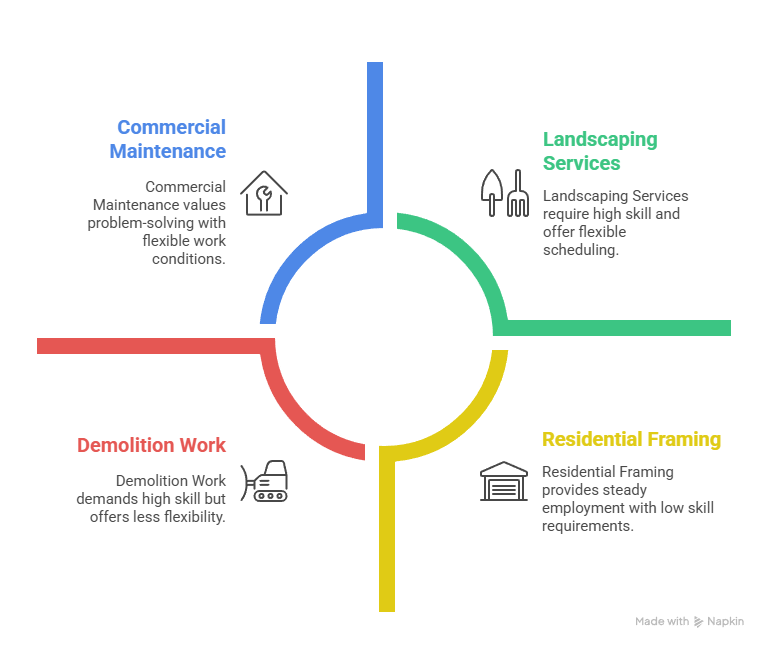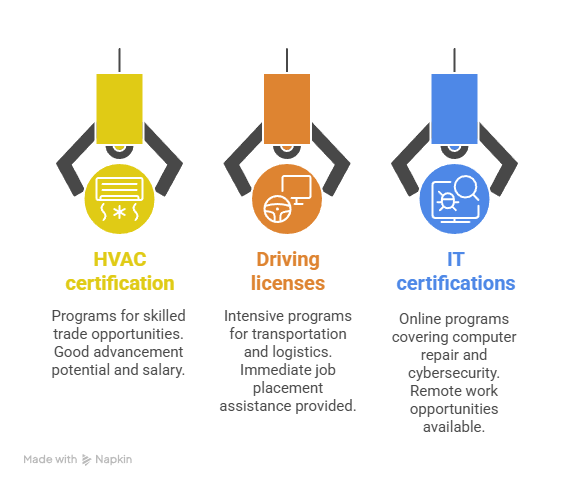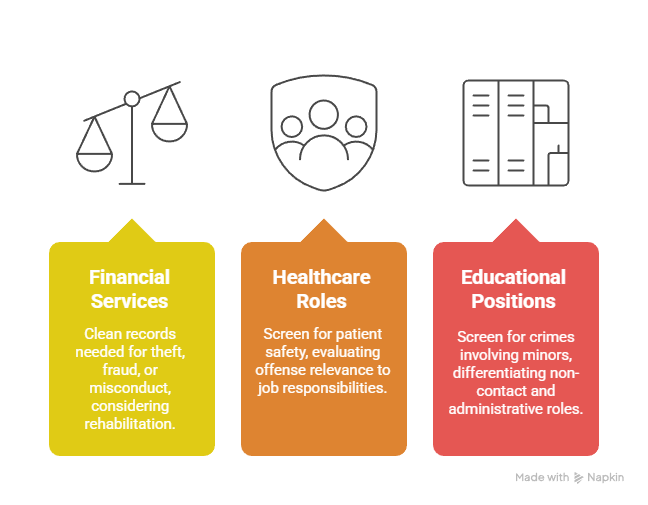Texas offers numerous employment opportunities for individuals seeking jobs with no background check, particularly in industries like hospitality, retail, construction, and gig economy work. The state's "Ban the Box" initiatives and growing second chance hiring movement have created pathways for fair chance employment, though job seekers must understand the legal landscape and strategic approaches to maximize their success.
Key Takeaways
- Texas Ban the Box laws restrict when public employers can inquire about criminal history, creating more opportunities for initial consideration.
- Industries with high turnover rates like food service, retail, and warehouse work often prioritize availability over background screening.
- Gig economy platforms and freelance opportunities provide immediate income without traditional employment barriers.
- Professional licenses may still require disclosure, but many trade jobs focus on skills rather than criminal history.
- Small businesses and local employers frequently offer more flexibility in hiring decisions than large corporations.
- Building professional networks and obtaining certifications can significantly improve employment prospects regardless of background.
Understanding Texas Employment Laws and Second Chance Hiring
Texas has implemented several measures to support fair chance employment. These measures reduce barriers for individuals with criminal records. Moreover, the state recognizes that providing employment opportunities is crucial for successful reintegration and reducing recidivism rates.
Under Texas Government Code Chapter 411, certain limitations exist on how employers can use criminal history information. Public employers in Texas cannot inquire about criminal history on initial job applications. This follows Ban the Box principles. However, private employers maintain more discretion in their hiring practices. This creates a mixed landscape of opportunities.
The Texas Workforce Commission actively promotes second chance hiring initiatives. They partner with employers who recognize the value of hiring individuals with diverse backgrounds. These partnerships have resulted in thousands of successful placements across various industries throughout the state. Additionally, many employers report higher retention rates among second chance hires.
The legal framework continues to evolve as more cities adopt fair chance ordinances. Austin, Dallas, and San Antonio have implemented local Ban the Box policies. These policies extend protections beyond state requirements. Furthermore, federal contractors must comply with additional fair chance hiring guidelines that create more opportunities for job seekers with criminal backgrounds.
Industries Most Likely to Hire Without Background Checks
Several Texas employment opportunities exist in industries that prioritize immediate staffing needs over extensive background screening. These sectors typically focus on skills, availability, and work ethic rather than criminal history. Consequently, job seekers can find meaningful employment while building professional experience and references.
Food Service and Hospitality
The food service industry consistently offers positions with minimal background screening requirements. Restaurants, cafes, and hospitality venues prioritize availability and customer service skills over criminal history checks. Fast-casual dining chains hire quickly to meet operational demands.
Many establishments focus on personality, work ethic, and reliability during the hiring process. Local restaurants often make hiring decisions based on face-to-face interviews alone. Kitchen positions frequently have the least screening requirements of all food service roles.
| Position Type | Typical Hiring Speed | Average Starting Pay | Growth Potential |
| Server/Waitstaff | 1-3 days | $12-15/hour + tips | Management roles |
| Kitchen Staff | Same day to 1 week | $13-18/hour | Head chef positions |
These positions offer valuable experience in customer service and team collaboration. Additionally, the food service industry provides opportunities for rapid advancement based on performance and reliability.
Construction and Manual Labor
Construction companies across Texas often prioritize skills and physical capability over background investigations. The industry's focus on immediate productivity creates opportunities for jobs for felons in Texas. Project deadlines drive hiring decisions more than criminal history considerations.

- Residential framing: Fast-paced work building homes with opportunities for skill development and steady employment with reliable contractors.
- Commercial maintenance: Building upkeep and repair work that values problem-solving skills and mechanical aptitude over formal background checks.
- Landscaping services: Outdoor work that emphasizes physical capability and attention to detail while providing flexible scheduling options.
- Demolition work: Specialized labor requiring safety consciousness and teamwork with higher pay rates than general construction.
These positions often lead to skill development and career advancement opportunities. Furthermore, many successful construction professionals started in entry-level positions and advanced through demonstrated competence rather than formal credentials.
Retail and Customer Service
Retail environments frequently hire based on availability and interpersonal skills. Background screening takes secondary importance to immediate staffing needs. Seasonal hiring periods create additional opportunities as retailers focus on meeting customer service demands.
Small retail establishments make hiring decisions based on personal interactions during interviews. Family-owned businesses often value loyalty and work ethic over formal background requirements. Local shops provide valuable experience and references for future career advancement.
Gig Economy and Freelance Opportunities
The gig economy provides Texas reentry jobs with flexible scheduling and minimal barriers to entry. These opportunities allow individuals to generate income while pursuing traditional employment or developing new skills. Moreover, performance-based compensation can exceed traditional hourly wages for motivated workers.
Ride-Share and Delivery Platforms
While major platforms conduct background checks, numerous alternatives exist for local delivery services. Food delivery for local restaurants often requires only a reliable vehicle and basic insurance. Grocery shopping services prioritize customer service skills over criminal history screening.
- Restaurant delivery partnerships: Direct relationships with local eateries that value reliability over background screening requirements.
- Grocery and pharmacy runs: Shopping services for elderly or busy customers with flexible scheduling and cash payment options.
- Pet care services: Dog walking and pet sitting that builds on personal relationships rather than formal employment screening.
These opportunities provide immediate income while building professional references. Additionally, successful gig workers often develop repeat customer relationships that provide stable income streams.
Digital and Remote Work
Remote work opportunities focus on skills and output rather than traditional employment screening. Freelance writing, virtual assistance, and data entry roles can be secured based on demonstrated abilities. Online portfolios showcase skills more effectively than traditional resumes for many employers.
Digital platforms evaluate performance through project completion and client feedback. Building positive reviews creates sustainable income opportunities without geographic limitations. These positions also provide flexibility for individuals managing other obligations while building professional experience.
Small Business and Local Employment Strategies
Small businesses represent the largest source of employment opportunities without formal background screening processes. These employers often make hiring decisions based on personal connections and demonstrated work ethic. Furthermore, small business owners frequently value loyalty and reliability over formal qualifications or background requirements.
Building Relationships with Local Employers
Networking within local communities creates connections that result in employment offers. Small business owners value personal recommendations and face-to-face interactions. Volunteering for community organizations demonstrates commitment and work ethic to potential employers.
Business networking events, chamber of commerce meetings, and community festivals provide opportunities to meet employers informally. Many successful job placements result from casual conversations rather than formal application processes. Building genuine relationships takes time but creates lasting employment opportunities.
| Business Type | Networking Approach | Success Timeline | Relationship Building Strategy |
| Local Restaurants | Visit during slow hours | 2-4 weeks | Demonstrate food service knowledge |
| Auto Repair Shops | Show mechanical interest | 1-3 months | Offer to help with simple tasks |
| Retail Stores | Become regular customer | 3-6 weeks | Show genuine interest in business |
These relationships often result in job offers before positions are advertised publicly. Moreover, employers who hire through personal connections report higher job satisfaction and employee retention rates.
Temporary and Staffing Agencies
Several Texas staffing agencies specialize in second chance hiring. These agencies work with employers who prioritize current qualifications over past mistakes. They understand the challenges faced by individuals with criminal records and actively seek inclusive employers.
Temporary positions often lead to permanent opportunities as employers evaluate performance. Building positive relationships with staffing agency representatives results in consistent work placements. Working with multiple agencies simultaneously increases opportunities and provides scheduling flexibility.
Professional Development and Certification Programs
Texas offers numerous certification programs that enhance employability regardless of criminal background. These programs focus on developing marketable skills that employers value over background considerations. Furthermore, completed certifications demonstrate commitment to professional development and current industry knowledge.
Industry-Specific Training
The Texas Workforce Commission provides funding for various training programs through federal and state initiatives. Participants develop expertise in high-demand fields while building professional networks. These programs often guarantee job placement assistance upon successful completion.

- HVAC certification programs: Six to twelve-month programs leading to skilled trade opportunities with starting salaries of $35,000-$45,000 annually and excellent advancement potential.
- Commercial driving licenses: Three to four-week intensive programs opening opportunities in transportation and logistics with immediate job placement assistance and starting wages above $40,000.
- Information technology certifications: Self-paced online programs covering computer repair, network administration, and cybersecurity fundamentals with remote work opportunities.
These certifications provide tangible evidence of current skills and knowledge to potential employers. Moreover, program graduates often maintain professional relationships that lead to job referrals and career advancement opportunities.
Apprenticeship Opportunities
Texas apprenticeship programs combine paid work experience with classroom instruction. These programs create pathways to skilled careers without traditional hiring barriers. Many apprenticeships partner with unions and trade organizations that prioritize skills development over background screening.
Electrician, plumbing, and welding apprenticeships provide structured career paths with progressive wage increases. These programs often lead to union membership and long-term career stability. The apprenticeship model allows individuals to prove their value through performance while earning income.
Legal Rights and Fair Chance Employment Protections
Understanding legal rights helps job seekers advocate for themselves during the hiring process. Texas fair chance employment laws provide certain protections for individuals with criminal records seeking employment. However, these protections vary between public and private employers and different types of positions.
The Texas Labor Code prohibits discrimination based on arrests that did not result in convictions. Employers cannot automatically disqualify candidates based on arrest records alone. Nevertheless, conviction records may still be considered depending on job requirements and time elapsed since the offense.
When Employers Can Consider Criminal History
Employers must demonstrate that criminal history considerations are job-related and consistent with business necessity. Positions involving financial responsibility, working with vulnerable populations, or requiring specific licenses may have legitimate reasons for background screening. The Equal Employment Opportunity Commission guidelines require individualized assessments rather than blanket exclusions.

- Financial services positions: May require clean records for crimes involving theft, fraud, or financial misconduct but should consider rehabilitation and time elapsed.
- Healthcare roles: Often screen for patient safety concerns but must evaluate relevance of specific offenses to job responsibilities and patient contact levels.
- Educational positions: Typically screen for crimes involving minors but should consider non-contact roles and administrative positions differently than classroom teaching.
Understanding these requirements helps job seekers target appropriate opportunities and prepare explanations for relevant background issues. Furthermore, many employers appreciate honesty and accountability when discussing past mistakes and current qualifications.
Job Search Strategies and Application Tips
Successful job searching involves identifying employers and positions most likely to offer fair chance employment. Research company policies and read job descriptions carefully to identify opportunities. Focus energy on supportive employers rather than those with strict screening requirements.
Targeting the Right Opportunities
Focus on companies that publicly support second chance hiring initiatives. Many major retailers, food service chains, and logistics companies have adopted fair hiring practices. These employers actively recruit from reentry populations and provide training and advancement opportunities.
Research company diversity and inclusion commitments on their websites and social media. Companies that emphasize second chances often feature employee success stories and community partnership information. Additionally, contact human resources departments directly to inquire about fair chance policies.
Interview Preparation and Disclosure Strategies
Prepare for potential questions about criminal history by practicing clear, honest responses. Focus on personal growth, skills development, and commitment to professional success. Redirect conversations toward current qualifications and career goals rather than dwelling on past mistakes.
Develop specific examples of recent achievements, volunteer work, and training completion. These concrete examples provide compelling evidence of positive life changes and current capabilities. Practice discussing these examples confidently and naturally during mock interviews.
Salary Expectations and Career Advancement
Entry-level positions in Texas jobs with no background check typically start at competitive wages for their industries. Food service positions often provide tip income that significantly increases total compensation. Construction and manual labor roles frequently offer overtime opportunities that boost earnings substantially.
Career advancement depends more on performance and reliability than formal education or background. Many successful professionals started in entry-level positions and advanced through demonstrated competence. Building strong work relationships and seeking additional training accelerates advancement opportunities.
Long-term Career Planning
Gig economy work can provide higher hourly earnings than traditional employment, especially during peak demand periods. However, these positions typically don't include benefits like health insurance or paid time off. Balancing gig work with traditional employment can optimize both income and benefits coverage.
Long-term career planning should include skills development and professional networking. Industry certifications and training programs provide pathways to higher-paying positions and supervisory roles. Many employers prefer to promote from within rather than hire external candidates for management positions.
Regional Differences Across Texas
Major metropolitan areas like Houston, Dallas, San Antonio, and Austin offer more employment opportunities but also face higher competition. These cities have more employers with formal fair chance hiring policies. Additionally, urban areas provide better access to training programs and support services.
Rural areas often have fewer total opportunities but may offer more personalized hiring processes. Small town employers frequently make decisions based on personal recommendations and community connections. Agricultural and energy sector jobs in rural Texas often prioritize physical capability and reliability over background screening.
Border communities have unique opportunities in international trade and logistics. Manufacturing facilities along the Mexican border often hire based on production needs and schedule availability. These regions also have specialized workforce development programs funded by international trade partnerships.
Technology Sector Opportunities
The technology sector in Austin and Dallas increasingly focuses on skills-based hiring. Many tech companies have eliminated degree requirements and background check barriers for non-sensitive positions. Coding bootcamps and technology training programs provide pathways into these higher-paying careers.
Software development, technical support, and digital marketing roles often prioritize demonstrated skills over formal credentials. Online portfolios and project samples showcase abilities more effectively than traditional resumes. Remote work options in technology expand opportunities beyond geographic limitations.
Building Professional Networks
Professional networking extends beyond job searching to long-term career development. Industry associations, trade organizations, and professional groups provide opportunities to meet employers and learn about career advancement paths. Many of these organizations have mentorship programs that support career growth.
Community involvement demonstrates commitment to positive change and builds valuable relationships. Volunteering for local charities, participating in community events, and joining civic organizations create connections with business leaders and potential employers. These relationships often result in job referrals and professional recommendations.
Social media platforms like LinkedIn allow professionals to showcase skills and connect with industry contacts. Building an online professional presence helps establish credibility and demonstrates current engagement with industry trends. However, ensure all social media profiles present a professional image that supports career goals.
Conclusion
Texas provides substantial opportunities for individuals seeking employment without traditional background check barriers. Success requires strategic targeting of supportive industries, continuous skill development, and persistent networking within local communities. The state's growing recognition of second chance hiring benefits creates pathways for sustainable career development. By understanding legal protections, focusing on skill-building, and approaching job searches strategically, individuals can secure meaningful employment and build successful long-term careers in Texas.
Frequently Asked Questions
Can Texas employers ask about criminal history on job applications?
Public employers in Texas cannot ask about criminal history on initial applications due to Ban the Box laws. Private employers have more discretion, though many are adopting similar practices to expand their candidate pools.
What industries in Texas hire without background checks?
Food service, construction, retail, gig economy platforms, and many small businesses frequently hire based on skills and availability rather than background screening. These industries often prioritize immediate staffing needs over extensive vetting processes.
Are there Texas laws protecting people with criminal records from employment discrimination?
Texas law prohibits discrimination based on arrests that didn't result in convictions. The EEOC requires employers to show that criminal history considerations are job-related and consistent with business necessity.
How can someone with a felony find work in Texas?
Focus on industries known for second chance hiring, work with specialized staffing agencies, pursue relevant certifications, and build professional networks through community involvement and volunteer work.
What should I do if an employer asks about my criminal history during an interview?
Be honest but brief, focus on personal growth and current qualifications, and redirect the conversation to your skills and value you can provide to the employer.
Do all jobs in Texas require background checks?
No, many positions don't require background checks, especially in high-turnover industries, small businesses, and gig economy work. Requirements vary by industry and specific job responsibilities.
Additional Resources
- Texas Workforce Commission Second Chance Program
https://www.twc.texas.gov/programs/second-chance-program - Texas Department of Criminal Justice Reentry and Integration Division
https://www.tdcj.texas.gov/divisions/rid/ - National Employment Law Project Fair Chance Hiring Resources
https://www.nelp.org/campaigns/ensuring-fair-chance-to-work/ - Texas Legal Aid Employment Rights Information
https://www.texaslegalaid.org/legal-topic/employment - American Job Centers of Texas Location Directory
https://www.twc.texas.gov/jobseekers/american-job-centers-texas - Texas Reentry Resource Directory
https://www.texasreentry.org/resources
Still have questions?
Get in touch with our team today for a personalized demo and discover how our tailored volume pricing and packages can drive results for your business!
How useful was this page?*
Note: your comments are anonymous. We use them to improve the website. Do not include any personal details.
Visit our FCRA Compliance Tool or leave a message here if you need a response.
From the blog Explore the GCheck Content Hub

How Long Does a Background Check Take? A Complete 2025 Guide
13 Dec, 2023 • 14 min read
The Ultimate Background Check Guide
13 Dec, 2023 • 4 min read
The Ultimate Guide to Employment Background Checks
13 Dec, 2023 • 10 min readThe information provided in this article is for general informational and educational purposes only and should not be construed as legal advice or a substitute for consultation with qualified legal counsel. While we strive to ensure accuracy, employment screening laws and regulations—including but not limited to the Fair Credit Reporting Act (FCRA), Equal Employment Opportunity Commission (EEOC) guidelines, state and local ban-the-box laws, industry-specific requirements, and other applicable federal, state, and local statutes—are subject to frequent changes, varying interpretations, and jurisdiction-specific applications that may affect their implementation in your organization. Employers and screening decision-makers are solely responsible for ensuring their background check policies, procedures, and practices comply with all applicable laws and regulations relevant to their specific industry, location, and circumstances. We strongly recommend consulting with qualified employment law attorneys and compliance professionals before making hiring, tenant screening, or other decisions based on background check information.

